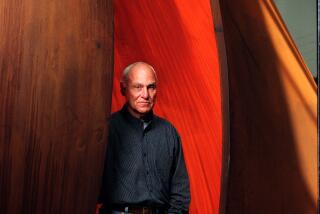PASSINGS: Dennis Oppenheim, Ed Mauser
Dennis Oppenheim
Conceptual artist and sculptor
Dennis Oppenheim, 72, a pioneering conceptual artist and sculptor who also made his mark on the earthworks and body art movements, died Jan. 21 of liver cancer at a New York hospital.
Beginning in the 1960s, his eclectic artwork included installation, performance art and video. By the 1980s he was making complex constructions he called “machine works.” Later he became interested in large-scale public works, inventive sculptures that were a synthesis of art and architecture.
Among his public art projects was a 36-foot-tall steel and concrete corkscrew-like sculpture called Bus Home at Ventura’s bus transfer station that he characterized as zany and uplifting.
“It aggrandizes the simple art of waiting for a bus to nearly the level of hallucination,” Oppenheim told The Times in 2002 when the installation was completed. “I’ve never seen anything quite like it.”
The Thomas Solomon Gallery in Los Angeles hosted Oppenheim’s last U.S. show, an exhibit of early works, last spring.
Oppenheim was born Sept. 6, 1938, in Electric City, Wash., and grew up in Northern California. He earned a bachelor’s degree in fine arts from the California College of the Arts in Oakland and a master’s in fine arts from Stanford University. He moved to New York in 1966.
Ed Mauser
Was oldest living member of ‘Band of Brothers’ unit
Ed Mauser, 94, who had been the oldest living member of Easy Company, the U.S. Army unit from World War II portrayed in the HBO miniseries “Band of Brothers,” died Jan. 21 in Omaha. He had pancreatic cancer.
Mauser was born Dec. 18, 1916, in LaSalle, Ill. He was drafted in 1942 and volunteered for the 101st Airborne. He was assigned to Company E, or Easy Company, which fought in some of the fiercest battles of the war. The men in the unit participated in the D-day invasion of France and Operation Market Garden. The 101st also helped defend Bastogne during the Battle of the Bulge.
Historian Stephen Ambrose interviewed Easy Company leader Dick Winters for the 1992 book “Band of Brothers,” which became the basis for the HBO miniseries that began airing in September 2001. Winters died earlier this month at 92.
Mauser was not among the soldiers portrayed in the miniseries. In fact, he shunned the limelight and kept his service with the Army unit a secret, even from some of his family.
His role came to light only after a friend lent him a copy of “Band of Brothers,” and he began telling his family that some of the things in the miniseries, like the locations of buildings, weren’t quite what he remembered.
After his actions became known, Mauser reunited with some of his Army buddies and made a few public appearances.
“Don’t call me a hero,” Mauser, who worked as a watch repairman and jeweler after the war, told the Lincoln (Neb.) Journal Star in 2009. “I was just one of the boys. I did what I was told, and let’s leave it at that.”
-- Los Angeles Times staff and wire reports
More to Read
Start your day right
Sign up for Essential California for the L.A. Times biggest news, features and recommendations in your inbox six days a week.
You may occasionally receive promotional content from the Los Angeles Times.






